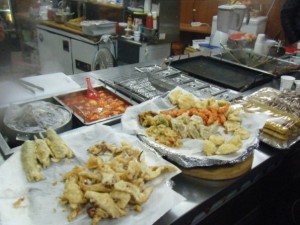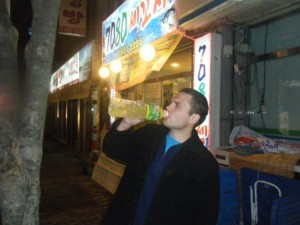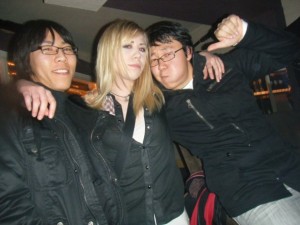
February 17, 2011
Dear Lawyer, Carpenter, Teacher, Artist, Friend, Family:
Here’s how things are NOW for me, EBravo.
You’ll be happy to hear that I’ve decided to apply to Law School next year instead of NOW. I still want to become a lawyer, now more than ever, but I’m not ready. I realize that. I’m going to need $110,000, which I don’t have, and I have zero plans to borrow money or take out any student loans, Thus, I need time to earn money and research Grant money opportunities – lots of money out there. In addition to the obvious financial factor, and equally as important, I’ll need to be able to NOT be high on ganja all the time, and have it NOT be a problem.
Funny coincidence – you know how much I prize coincidence…here’s a little story about how I quit drinking and decided to go to Law school on my Sister the Lawyer’s birthday.
A little character-based setting to create mood…

I play drums in a band, a trio called Coffee Pot Break with two friends whom I first met in Berkeley’s Barrington Hall in fall 1987. My artist pal, called Chepe Escondido in my writings, owns a huge house on a hill in East Los Angeles. It’s amazingly spacious with breathtaking views from the roof.


Over the last few years, Chepe single-handedly transformed what was once a slanted dirt hill of shrubs, his backyard, into a HUGE enchanted terraced garden full of dwarf fruit trees, herbs, vegetables, colorful ceramic pieces and homemade tile stepped paths. Beneath the house is a high ceiling in the lower level, two storey basement, inside which, Chepe has created an immaculately ordered painting and ceramic studio with paints, brushes, tools and a kiln; also, a music studio with drums, bass, guitar, amps, PA system, microphones; mike and music stands, mixer, monitors, speakers, and computerized recording equipment, all State of the Arts. The computer monitor plays South Park or 30 Rock, John Coltrane concerts or documentaries with the volume down low while we play. We can still hear Eric Cartman say, “Screw you guys, I’m getting home-schooled! and That’s a bad Phonics monkey!” Chepe records himself playing all 3 parts: guitar, bass and Roland V Drums; he sings songs he writes himself. Chepe’s songs are catchy and piercing, and they sound much better when Flibby plays the guitar part and I play the drums. We all agree on that. Flibby completes our trinity.






Almost every morning for the past three weeks, ending Tuesday, Chepe and I have managed to work in a practice, a run through of our entire set – 24 original songs; we don’t do any covers, except as a goof. We sometimes play reggae or jazz or superfast versions of our songs. Chepe sings and plays bass and handles all the equipment; I play drums only. Flibby has his own guitar: an all black Gibson Les Paul and old school amp stack, which he leaves in the studio. We sound very professional, super tight. Chepe’s baby mama is going to make a music video of us and we’re going to go viral, when Flibby returns from the place he’s currently working in Bridgeport California, doing construction work in the snow near the US Marine base where they train soldiers to fight on skis, like in the James Bond film, The Spy Who Loved Me. Flibby will return in two weeks. We are Dr. Rock, Dr. Scissors and Dr. Paper. I’m the paper.
My carpenter friend Flibby, Dr. Scissors the Tool man, full name Flibworth Thurstein in my writings, is the strongest man in the world. Flibby never graduated from Cal, or any Institute of Higher Learning. Flibby dropped out and has smoked unbelievable amounts of ganja everyday, long as I’ve known him, going back to childhood I guess. Flibby does and has done the same job everyday that he’s done since 1990, only now legit and certified, with a house, a truck, and more tools than you’ve ever seen. Flibby was the first person I know in my age group to get married, 15 years ago, and buy a house with his own money. He still lives in the same house in Fontana with his wife, named Erica, who is very similar to me, according to Flib. It’s scary sometimes, the coincidences.



Flibworth Thurstein and I are as close as two men can be to each other without being sexual. Chepe and I have the same relationship, but different roles. In SKorea, they would both be my hyung. I’d never call them by name, only Hyung, if we were Korean. Chepe and Flibby have known each other since Barrington Hall Berkeley1987 but have only become close over the last 7 years, in my absence, since they are both avid horticulturalist homeowners who like to work in their yards, create stuff and take coffee pot breaks. Chepe is Dr. Rock, cuz he’s a pot yielding ceramicist; and cuz he’s the most foundation worthy of us, with three daughters: each named for the Earth, Tonatzin, the Moon, Luna, and the Sun, Sol: the original Trinity.
The three of us Doctors of Music lived in Fiction house together after two and a half years of Barrington Hall. After which, I moved to LA where Chepe had recently returned. Flibby moved to Genoa house in North Oakland, which, if you follow Berkeley/Oakland punk rock history, is pretty legendary. Genoa House is currently owned and operated by John Benson-hurst, Barrington Old Member/Activist. Flibby lived in Genoa’s 2nd storey backhouse, which he pimped out with raised ceiling, wood burning stove, wide wooden 2nd storey deck, and a long narrow wooden footpath hovering across the large backyard lawn in a downward slope, leading from the 2nd storey deck to the house’s main floor deck. Flibby lived at Genoa for 5 years before moving to the Inland Empire, buying a house in Fontana, marrying a woman after knowing her only 2 weeks, a 20 year old ganja smoking Mexican beauty who grew up in Germany and is fluent in English, German and Spanish. That was 1995, when I lived by myself in my Hollywood bungalow on Cahuenga up near the Bowl. The only party I ever threw was, coincidentally, the week after they got married. I was as surprised as everyone. They came over all festive, and then at the party’s end, instead of cleaning, I returned with them to their new house and spent the rest of the weekend in Fontucky.
Flibby’s mom is of Mexican descent, Chepe’s parents are both Mexican, Erica’s Mexican. What’s up with all the Mexicans?
Anywho, Flibby is the strongest man in the world. Flibby tells me that I must have the mental will to be able to enjoy a beer or two or a shot of tequila, and then stop thinking about booze. Over the last 23 years, Flibby’s gone for months, years at a time without drinking; then he’ll drink, a lot sometimes, but never excessively. “Just control it,” he tells me. Chepe’s the same way. Chepe’s got bottles of tequila, seldom seen brands de Jalisco, that remain in cabinets in his studio for weeks, months. I can’t do that. Did I do that? Chepe smokes weed almost every day, and lots of it. They both grow legally, doctor’s prescription. I was turned down for one!
Apparently, all you have to do is say you’re an LAUSD teacher and they’ll give you one. Carpenters get them for their backs. And they can have up to 4 plants. Chepe and Flibby have amazing harvests with just 4 plants or fewer; they are both skilled agriculturalists. Chepe gets more done in a day than any person I’ve ever met in my life; his yard is like a produce isle, exotic fruits ripe for the picking. Flibby’s first alarm clock goes off at 3:40 am; he enjoys praying with Manny Mota, Patron Saint of Pitch Hitters, at 4:20 before sunrise. Flib often drives to San Diego, works a full day, then drives to Chepe’s for band practice, picks up a few burritos to go at nearby Los Portrillos Taco Truck, then drives home to his wife in Fontana.



Flibby offered me a beer the day after I took my LSAT at band practice. I thought: It’s either the beer or the chip.
I wear around my neck, one of my father’s old 30 day sobriety chips from AA. I started wearing the White plastic chip on this silver chain I wear – a chain that originally came from my grandmother Marina in Lima Peru, my mom’s mom. I started wearing the pearly chip the morning I took my LSAT, which coincidentally was 30 days after my sister’s birthday, the day I quit drinking, the day I decided to go to Law School. I’m hoping to earn then wear the Green 60 day chip, then the Red 90 day chip, and so on till I run out of chips. My dad went to AA back in the 80’s. My father never really quit drinking, but he did earn himself a few chips in the process. Several chips of various colors now reside here in dad’s old jewelry box with his cufflinks and tie clips, here on his old table in his old bedroom, which is now my room. It’s the place I spend the bulk of my time not sleeping. It’s also the only place I’ve slept since November 2009. I’ve never been to AA, except for 10 times in 1994, through coercion by the California Penal system. I hope AA doesn’t mind me using their chips.
Not drinking is the best thing I’ve done for myself in a long time. I feel great. And it has been a lot more difficult than I let on. I have a 3rd LA friend named St. Tommy who lives in the Valley, whom I first met in Beverly Hills back in 1984.



Saint Tommy lived with his mommy in the building next to me and my family. I was in high school and Saint was 21, able to buy beer. We never drank the hard stuff. We were in competition to see who was the poorest on the block, to see who could have the most fun with the least dough. St. Tommy has been good about counseling me lately about the mental addiction that is so strong. St. Tommy was a heavy boozer who quit in 1991, the year I returned to LA from Berkeley. St. Tommy too, coincidentally, returned to LA in 1991, from Santa Cruz California, after years away. In 1995, Saint came by my Hollywood bungalow on his Honda Gold Wing with a votive candle and a sack on ganja, on his way to Griffith Park for a gathering, the night Jerry Garcia died. I stayed home, listened to the Grateful Dead's American Beauty album and smoked crack.
The truth that one day in the future I’m gonna get drunk, that’s enough for NOW. That’s what I did with crack. Right now, I don’t feel like drinking, nor do I feel like waking up hurting. I can NOT drink socially and within reasonable limits no matter how hard I try. I don’t mind that some people can while I can not.
People are made as they are for a reason. Dime con quién andas y te diré quién eres.
Enough setting, here’s the story of HOW and WHY I decided to go to law school:
TO BE CONTINUED another day





































Recent comments